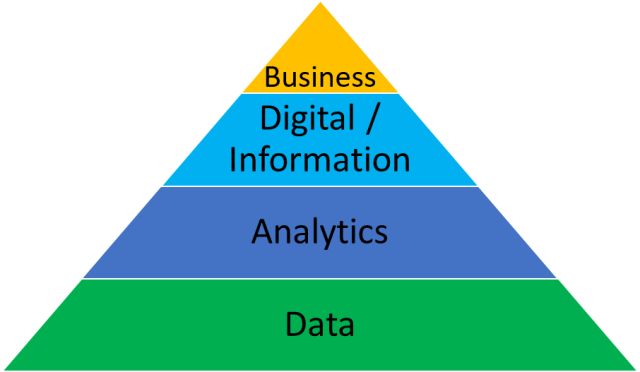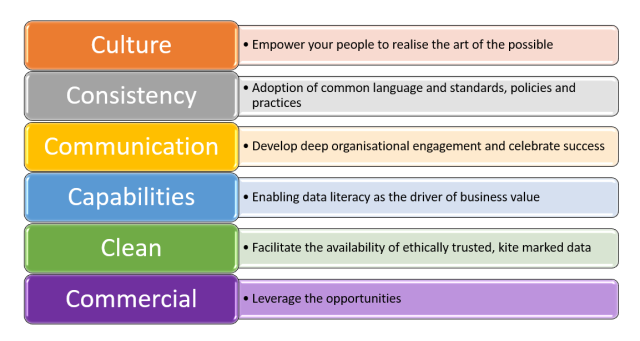Following my panel appearance at the recent IRM Enterprise Data and BI & Analytics European Conference where we discussed data strategy and, myself and fellow panel members were named CDO Lions! Below is a summary of my thoughts shared at the event.

Liz Henderson, Independent Consultant
Liz will be speaking at the IRM UK Master Data Management Summit & Data Governance Conference Europe 12-15 May 2020, London. She will be speaking on the subject ‘First the Foundations for Your Data Initiative‘
This article was previously published here.
Data Strategy- what do we mean, and do we need one?
I think we all know that Data matters to any company, especially if you are reading this post, you at least have an awareness that it is something you should be considering.
Data is one of our biggest business assets, just like our people. We would never consider ignoring or not managing our people, so why is it ok to do that to our data?
Many companies have the ambition to generate value from their data whether that is internal efficiencies or external revenue growth. To achieve that having a Data Strategy will set the direction for your data initiatives and how it will support the business strategy objectives.
When developing a data strategy, I would advocate developing a roadmap for delivery. Without a plan and metrics will your strategy every move forward?
It should be remembered that a data strategy is not a stand-alone document, nor is it a secret. You want buy-in to move the business forward on their data journey. Sharing your ambitions in your strategy and why will help on that journey
How does a data strategy work with an analytics, information and digital strategy?
Here are my thoughts. As mentioned, a data strategy is not an isolated, siloed document, it must be driven by the overarching business strategy. I see a triangle here as the best way to demonstrate how they all fit together – your strategy triangle!

The Data Strategy is the foundation for what data you have and what to do with it – without which all the other strategies will not be successful.
The Analytics strategy feeds into your Information Strategy as without Analytics on the raw data you would struggle to gain insight and generate information to make decisions. – develop insight & information for cultivating a data driven decision environment
Information Strategy for what you want to achieve from manipulating the raw data into insights and generate information to make decisions
And Digital Strategy of how you want to move the business forward towards a digital environment
Feeding up directly into delivering the direction of the business, based the business strategy
I would not suggest trying to deliver all at the same time – in my experience start with the foundation – Data Strategy
What do you need to include in your Data Strategy?
For me the key elements are:
- Culture
- Consistency
- Communication
- Capabilities
- Clean
- Commercial

Culture
To support the journey that is needed to achieve the cultural shift to start thinking about data as a valuable asset. Empower your people to believe in the art of the possible with what they can do with data, ideas, suggestions, testing hypotheses.
The roadblocks in organisations at present are Culture and data literacy – key things to think about on how you can improve these for your organisation.
Consistency
Adoption of a common language or business glossary. You want data to me used and understood in a consistent manner.
Communication
To develop deep organisational engagement to support the journey of the cultural shift. How will you communication to your people to help them feel part of the journey and they are involved and have a say. Regular updates, emails and town halls. Booths or clinics to visit for answering questions. Experts locally based for support. Notices / flyers / guidance on desks for whom to speak to or lists of FAQ’s.
How will you celebrate success, have a few pilots running to show as examples of how to do things and the benefits they generate. Celebrate when things work well or are done correctly; A box a chocolates, a bottle of wine and team lunch.
Capability
The foundations of any organisation and data strategy, without the right capabilities within the business none of your strategy will be successful – enable good data literacy as the driver for business value.
Linked in with communication and culture, you need your people to grow and develop their capabilities to help them feel comfortable with data. How would you do this in your organisation?
Clean, fit for purpose data
Standards, policies, & practices have these defined, accepted across the business and monitored for data collection and governance of data
Commercial
How is all this management and control of your data going to benefit the organisation?
This is likely to come out of your business strategy as the objectives for the organisation. How can data enable these ambitions?
Future trends 2-3 year horizon to include are
Thinking slightly longer term with your strategy and it could be as short as 6 months or longer to 5 years. An average is 2 years. My thoughts on what could be on your horizon.
Augmented Data Management – self-configuring and self-learning systems. Think self-driving cars taking in information around them, then think data tools which take in information on usage, best practices and policies to make suggestions on rules, etc.
Natural Language Analytics – How our less technical colleagues can ask for top 10 sales within 5 miles against last year just like asking Google a question. Easy access to systems instead of asking your data scientist team or IT. Bringing efficiencies to the business and empowering individuals.
Automation & AI -Performing tasks and supporting users with greater intelligence for data matching and merging and DQ rule generation in collaboration with the augmented capabilities.
What will your data strategy contain and far out will it be planned for?
Liz has over 15 years experience with a proven track record of leading and shaping data strategy, advising and executing a wide range of corporate compliance and digital transformations with a sustainable platform for expansion and profitable growth from data. With her passion for data she evolves the creation of a data-driven culture and has solved problems which many organisations experience with duplicate, inconsistent and incomplete data, on multiple siloed platforms. When she is not governing data, she enjoys yoga, gardening and travelling, has a data blog lizhendersondata.wordpress.com, is a STEM ambassador, mentor and a non-executive director for two charities; supporting young people and the community. Follow Liz on Twitter: @Ehdata
Copyright Liz Henderson, Independent Consultant


